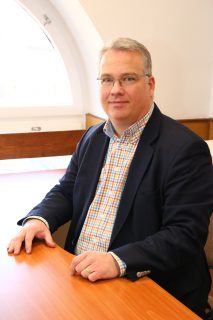As senior advisor to the rector, honorary associate professor and doctor of veterinary medicine, Professor dr Miklós Süth has received two main tasks: first to facilitate the American accreditation of the educational programmes of the University of Veterinary Medicine, Budapest; and second, to provide food chain safety with a stronger emphasis in veterinary education programs. He was becoming familiar with the requirements of food hygiene already as a child learning the alphabet in his home in the Hungarian town Pápa, where his father worked in the meat factory. He has gained international experience as the youngest Hungarian chief veterinarian of the EU, from the age of 33. Below you will find an excerpt from the interview.
 – Professor, has family tradition assisted you in your choice of a career path?
– Professor, has family tradition assisted you in your choice of a career path?
– I might say I was born into food hygiene since my father took us both with my sister into the meat factory plant at Pápa and showed us the process from the beginning to the end. He had been working as a butcher from the age of 16 and, with his professional talent, persistence and diligence, he climbed all steps of the career ladder up to the director’s office. He was a dedicated prisoner of meat industry and food hygiene. My mother was the cohesive force of the family, sacrificing every minute of her life to serve us. Her family came from agriculture; I think that my agronomist grandfather played a huge role in creating my bonding to animals as a child and a teenager. Besides, I was striving to be as good a student as my sister was, who is five years older than me and studied to be a doctor.
– You have been a chief veterinarian since 2005. What do you consider to be your greatest achievement in this position?
– Hungary has been the first to introduce food chain supervision, a special integrative perspective of all authorities guaranteed from soil to the food on the table. During my leadership we organized all authorities and tasks responsible for soil protection, plant and animal health to commerce and catering into one comprehensive organization, thus giving the customer real life-giving food instead of feeding them with something to quench their hunger but leaving health factors out of consideration. I think that, together with my colleagues, I can be proud of the fact that Hungary has been the first to develop an integrative food chain supervision authority, brought to life by the leadership of veterinarians, based on the organization we had started.
– You are working as senior advisor to the rector in your alma mater. In what fields are you contributing to the development of the university?
– I received the honour from Professor Dr Peter Sótonyi, who asked me to assist him in the preparatory work for the American accreditation of our veterinary education programmes. This may also lead to a reinforced position of our institution in the international competition and to further enhancement of the prestige of Hungarian veterinary education.
My second task is to contribute to the creation of a food chain safety research, development and innovation centre as indicated in the Digital Agriculture Strategy, under the guidance of the University of Veterinary Medicine, Budapest. The purpose of this innovation centre is to create a stronger presence of food chain science and perspective in veterinary education. Our idea is to develop a unique knowledge centre in this region. Everyone would like to have a long and healthy life. 70 percent of substances with a harmful effect on our organism come from food. In order to manage and mitigate this risk we have to evaluate all processes in an integrated way, using a preventive and matrix perspective as well as the tools of network research. Only if equipped with such results will we be able to model and forecast future processes and events in food chain safety and animal health.
Interview by Gusztáv, Balázs – UNIVET Magazine, 2019 March
